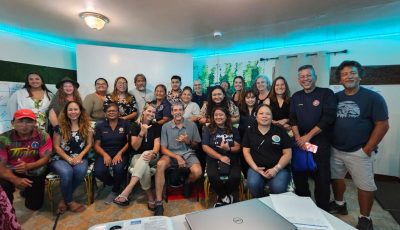CHC says it is closely monitoring Ebola incidents around the globe
One of the most virulent diseases in the world is in the radar of the islands’ lone hospital.
According to Warren Villagomez, Public Health and Hospital Emergency Preparedness Program director, the Commonwealth Healthcare Corp. is making sure that all surveillance activities and monitoring are done on all critical access points and sentinel sites everyday in the CNMI with regards to the Ebola virus.
“These updates and protocol are being sent out to local state and federal partners twice a week and we are in close communications with the Centers for Disease Control and Prevention Quarantine Office in Hawaii for any support,” CHCC said in a statement.
“Also CDC had opened its emergency operation center headquarters in Atlanta 24/7 since July 2014 to accommodate response efforts dealing with this public threat,” CHCC added.
CHCC wants the community to know that they are addressing the issue.
Symptoms for Ebola include fever that is greater than 38.6 Celsius or 101.5 Fahrenheit, severe headache, muscle pain, weakness, diarrhea, vomiting, abdominal (stomach) pain, and lack of appetite.
The symptoms may appear anywhere from two to 21 days after exposure to the Ebola virus, although eight to 10 days is the most common.
“Some who become sick with Ebola are able to recover. We do not fully understand why. However, patients who die usually have not developed a significant immune response to the virus at the time of death,” CHCC said.
According to the World Health Organizations, in past outbreaks, up to 90 percent of humans who contract the virus have died. The current outbreak in West Africa has a 47-percent survival rate.
CHCC said that barrier nursing techniques against the Ebola virus include wearing protective clothing such as mask, gloves, gowns and goggles, using infection-control measures, and isolating patients with Ebola from contact with unprotected persons.
“The aim of these techniques is to avoid contact with the blood or secretions of an infected patient. If a patient with Ebola dies, direct contact with the body of the deceased patient should be avoided,” CHCC said.
CHCC wants the public to be cautious in traveling and practice good hygiene, avoid contact with blood and body fluids, avoid handling items that may have been in contact with an infected person’s blood or bodily fluids, avoid funeral or burial rituals where handling the body of someone who has died from Ebola is required, avoid contact with bats and nonhuman primates or blood, fluids, and raw meat prepared from these animals, avoid hospitals where Ebola patients are being treated, and after returning, monitor your health for 21 days and seek medical care immediately if you develop symptoms of Ebola.
“In addition to CDC, we are also monitoring guidelines and advisories from World Health Organizations. We want to assure the public that our surveillance team is monitoring this daily,” CHCC chief executive officer Esther Muna said.



























